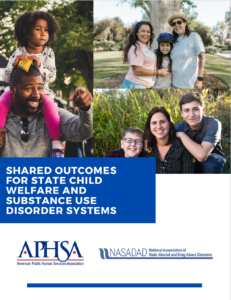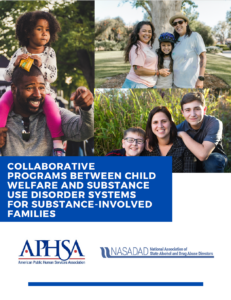Research has shown that if left untreated, parental substance use disorders (SUD) can have a negative impact on the entire family. According to a Substance Abuse and Mental Health Services Administration (SAMHSA) study published in 2017, approximately 1 in 8 children in the United States lived with a parent who had a past year SUD. While many children who are exposed to parental substance misuse will not experience maltreatment, they are at higher risk of maltreatment and child welfare involvement and are twice as likely to develop an SUD themselves. Intentional planning and coordination between state alcohol and other drug (AOD) and child welfare agencies are essential to prevent the negative consequences that SUD can have on families and prevent children from entering the foster care system.
To strengthen the collaboration and relationship between these agencies, the American Public Human Services Association (APHSA) and the National Association of State Alcohol and Drug Abuse Directors (NASADAD) launched a workgroup of state child welfare and AOD leaders. Through a series of meetings conducted throughout 2022, agency leadership worked together to understand the barriers and opportunities to align systems and improve services for shared populations. Those conversations initiated the development of foundational resources for both agencies that outlined shared outcome measures and examples of existing collaborations between the two systems. Guided by the workgroup, APHSA and NASADAD worked together to create two resources for AOD and child welfare agencies, as well as other organizations that work with child welfare-involved families impacted by substance use:
 Shared Outcomes for Child Welfare and Substance Use Disorder Systems– This document aims to provide child welfare and AOD systems with guidance to start and deepen conversations by enabling state agencies to jointly assess the services offered to child welfare-involved families impacted by substance use.
Shared Outcomes for Child Welfare and Substance Use Disorder Systems– This document aims to provide child welfare and AOD systems with guidance to start and deepen conversations by enabling state agencies to jointly assess the services offered to child welfare-involved families impacted by substance use.
 Collaborative Programs Between Child Welfare and Substance Use Disorder Systems – This document provides state agencies with existing models of collaboration between child welfare and AOD agencies along with court systems.
Collaborative Programs Between Child Welfare and Substance Use Disorder Systems – This document provides state agencies with existing models of collaboration between child welfare and AOD agencies along with court systems.
Please direct any questions to Caroline Halsted (chalsted@nasadad.org).